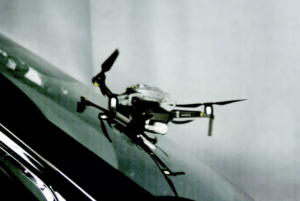
Data gathered in the study resulted in State Farm® receiving an FAA waiver to fly over moving vehicles as of the end of 2019, prior to the release of the FAA rule for flight over people and moving vehicles released at the end of 2020.
Regulators and communities have been afraid that a drone crashing into a windshield would result in shattered glass, at best making it impossible for the driver to see and at worst injuring the people inside the car. At Virginia Tech’s impact labs, however, researchers were able to demonstrate conclusively that drones can be flown over cars safely, when the cars are driving at speeds under 62 mph.
Using a drone equipped with a ParaZero drone safety system, which includes a parachute to limit the velocity of crash, researchers were able to show “that a small parachute-equipped drone won’t actually damage a car traveling at average in-town speed limits,” says a State Farm press release.
“The data represent the first known example of direct research on drone-automobile collisions – a unique collaboration between drone specialists at the Virginia Tech Mid-Atlantic Aviation Partnership(MAAP), injury biomechanics experts in the university’s College of Engineering, and State Farm,” says Virginia Tech.
Since the demonstration shows that the key differentiator is speed, regulators are able to define operations that don’t pose any danger. “The slim margin between a virtually pristine windshield and a destroyed one drew a clear boundary around low-risk scenarios,” says the release. “The data showed that as long as potential relative impact speeds never exceeded 62 mph, flights over moving vehicles presented minimal risk.”
The FAA permission for flight over moving vehicles is a significant gain in efficiency for State Farm and their customers. Claims investigators are able to survey multiple homes in one neighborhood, traveling across streets. In post disaster situations, when many homes in one area may be damaged, the waiver will allow State Farm to evaluate damage – and help homeowners – quickly.
Miriam McNabb is the Editor-in-Chief of DRONELIFE and CEO of JobForDrones, a professional drone services marketplace, and a fascinated observer of the emerging drone industry and the regulatory environment for drones. Miriam has penned over 3,000 articles focused on the commercial drone space and is an international speaker and recognized figure in the industry. Miriam has a degree from the University of Chicago and over 20 years of experience in high tech sales and marketing for new technologies.
For drone industry consulting or writing, Email Miriam.
TWITTER:@spaldingbarker
Subscribe to DroneLife here.